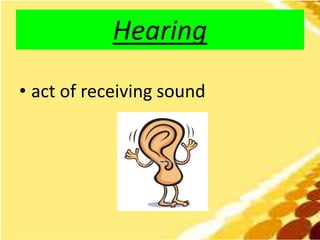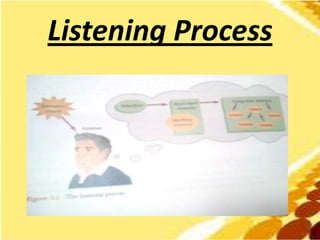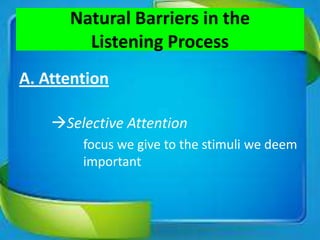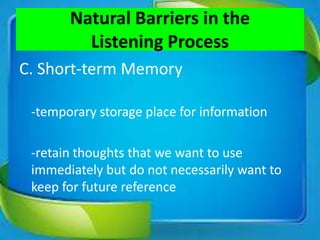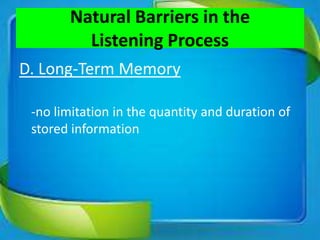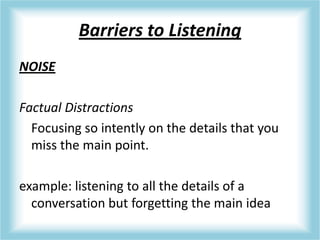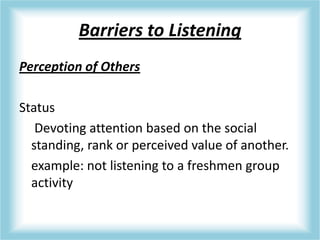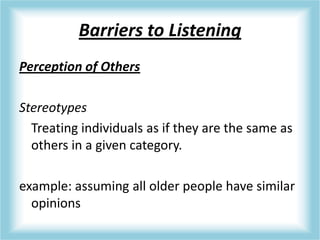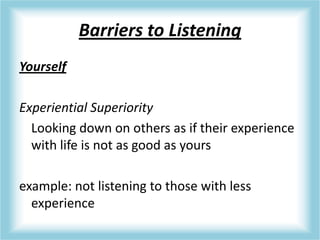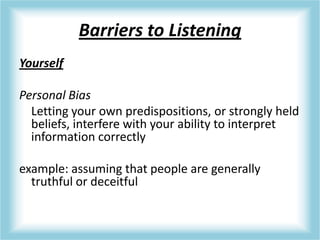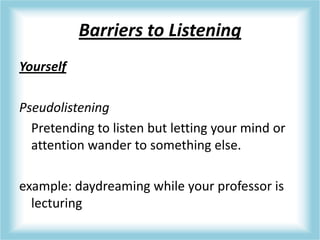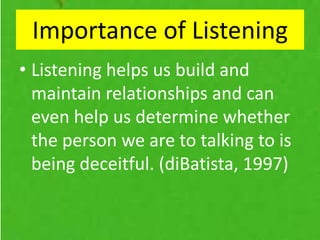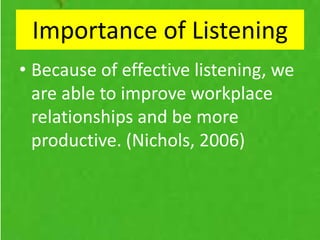Listening process
- 3. Hearing • act of receiving sound
- 4. Listening • the active process of receiving, constructing meaning from, and responding to spoken or non- verbal messages
- 5. Listening • involves the ability to retain information, react emphatically, and appreciate to spoken or non- verbal messages
- 6. Listening • primary way that we understand others, enrich our own lives, and learn important and vital information
- 8. “Upon hearing your favorite song, the voice of your favorite artist, or the sound of a police siren, you immediately know what they mean. Your interpreted message is then stored in short-term memory for immediate use or in long- term memory for future recall.” (Janusik, 2005)
- 9. Natural Barriers in the Listening Process A. Attention Selective Attention focus we give to the stimuli we deem important
- 10. A. Attention Automatic Attention focus we give tot the stimuli signaling in our surroundings, stimuli that we deem important, stimuli that we perceive to signal changes Natural Barriers in the Listening Process
- 11. B. Working Memory -part of our consciousness that interprets and assigns meaning to stimuli we pay attention to Natural Barriers in the Listening Process
- 12. B. Working Memory -recognizing patterns and immediately assigns meaning Natural Barriers in the Listening Process
- 13. C. Short-term Memory -temporary storage place for information -retain thoughts that we want to use immediately but do not necessarily want to keep for future reference Natural Barriers in the Listening Process
- 14. C. Short-term Memory -limitations in quantity or duration of stored information *POST IT Natural Barriers in the Listening Process
- 15. D. Long-Term Memory -permanent storage place for information: past experiences, language, values, knowledge, images of people, memories of sights, sounds, and smells and even fantasies Natural Barriers in the Listening Process
- 16. D. Long-Term Memory -no limitation in the quantity and duration of stored information Natural Barriers in the Listening Process
- 17. D. Long-Term Memory “Schema” : organizational ‘filing systems’ for our thoughts held in long-term memory Natural Barriers in the Listening Process
- 18. • How come we forget things even if it is in the long-term memory already?
- 19. Barriers to Listening NOISE Physical Distractions All the stimuli in the environment that keep you from focusing on the message. example: loud music playing
- 20. Barriers to Listening NOISE Mental Distractions The wandering of the mind when it is supposed to be focusing on something. example: thinking about a lunch date while listening to a teacher
- 21. Barriers to Listening NOISE Factual Distractions Focusing so intently on the details that you miss the main point. example: listening to all the details of a conversation but forgetting the main idea
- 22. Barriers to Listening NOISE Semantic Disorders Overresponding to an emotion-laden word or concept. example: not listening to a teacher when he/ she mentions “Marxist Theory”
- 23. Barriers to Listening Perception of Others Status Devoting attention based on the social standing, rank or perceived value of another. example: not listening to a freshmen group activity
- 24. Barriers to Listening Perception of Others Stereotypes Treating individuals as if they are the same as others in a given category. example: assuming all older people have similar opinions
- 25. Barriers to Listening Perception of Others Sights and sounds Letting appearances or voice qualities affect your listening example: not listening to a person with a screechy voice
- 26. Barriers to Listening Yourself Egocentrism Excessive self-focus, or seeing yourself as the central concern in every conversation example: assuming all older people have similar opinions
- 27. Barriers to Listening Yourself Defensiveness Acting threatened and feeling like you must defend what you have said and done. example: assuming others’ comments are veiled criticisms of you
- 28. Barriers to Listening Yourself Experiential Superiority Looking down on others as if their experience with life is not as good as yours example: not listening to those with less experience
- 29. Barriers to Listening Yourself Personal Bias Letting your own predispositions, or strongly held beliefs, interfere with your ability to interpret information correctly example: assuming that people are generally truthful or deceitful
- 30. Barriers to Listening Yourself Pseudolistening Pretending to listen but letting your mind or attention wander to something else. example: daydreaming while your professor is lecturing
- 31. Importance of Listening • Listening helps us build and maintain relationships and can even help us determine whether the person we are to talking to is being deceitful. (diBatista, 1997)
- 32. • Listening is also recognized as an essential skill for business success. (Haigh, 2006) Importance of Listening
- 33. • Because of effective listening, we are able to improve workplace relationships and be more productive. (Nichols, 2006) Importance of Listening
- 34. References • Lucas, Stephen E. (2009). The Art of Public Speaking. 10th ed. New York: McGraw-Hill Companies, Inc. • Pearson, J. et. al. (2008). Human Communication. 3rd ed. New York: McGraw- Hill Companies, Inc.


